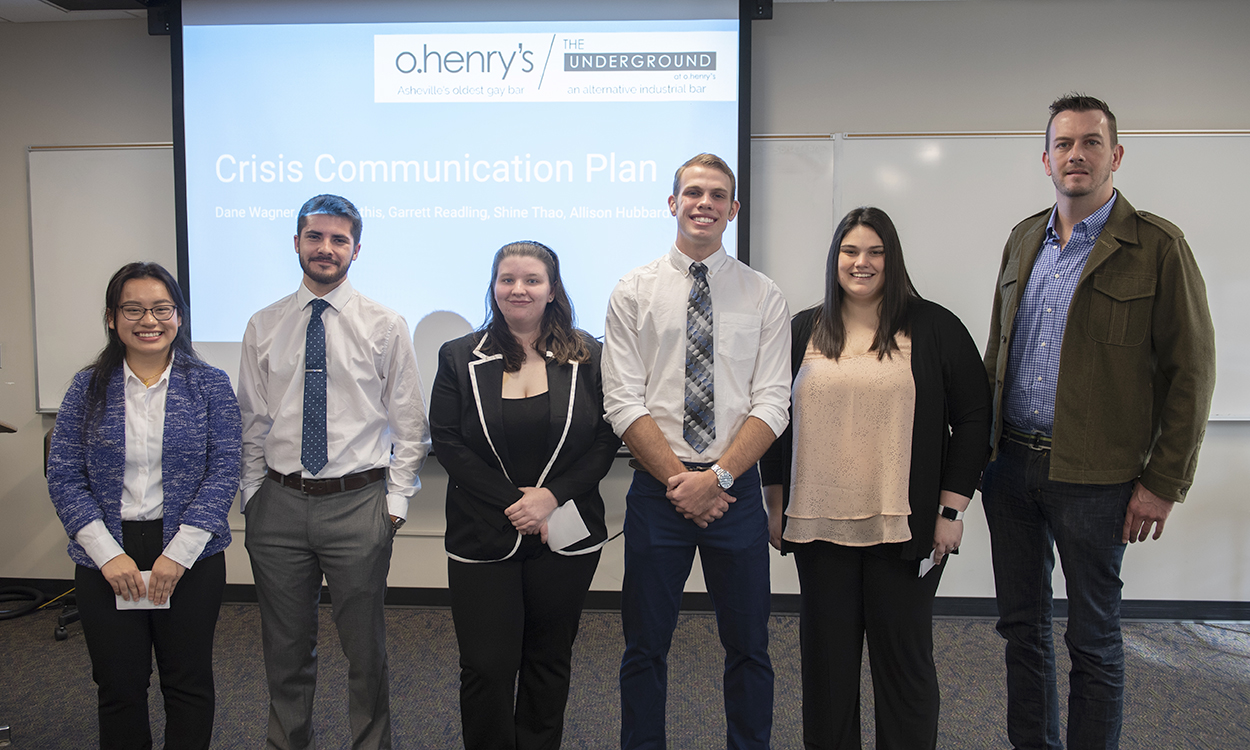Students develop crisis communications plans for regional clients

WCU students who developed a crisis communications plan for O.Henry’s of Asheville – (from left) Shine Thao, Garrett Readling, Kasey Mathis, Dane Wagner and Allison Hubbard – meet with owner and client Derick Boyd.
Four businesses and one nonprofit organization will start 2019 better prepared to manage crises, thanks to the work of Western Carolina University students enrolled in a course in “Crisis Communications” during the fall semester.
Over a period of three months, five student teams collaborated with regional clients to develop crisis communications plans, which are designed to help organizations identify, plan for and respond to potential crises. While the plans may identify several possible crisis situations an organization may experience, the WCU student teams tailored each of their plans to one crisis scenario chosen by their clients.
The plans identify who should be part of the crisis team, who should serve as media spokesperson(s), and the priority audiences and preferred channels for reaching audience members. They also identify key messages, and provide drafts of materials such as website updates, internal emails and social media posts written in anticipation of the chosen crisis scenario. The plans also remind employees of the organization’s social media policy and the expectations for employee engagement on social media during a crisis.
“Communication during crises is critical,” said Betty Farmer, professor of communication and public relations and crisis communications consultant, who taught the course and led the student teams. “While effective communication can make a crisis better, poor communication can make a crisis much worse. Organizations need to prepare before a crisis occurs, as the response time in today’s digital media world is now minutes, not hours or days.”
Clients were selected based on whether similar organizations had recently experienced significant crises. For example, O.Henry’s of Asheville was invited to participate because of the 2016 active shooter incident at Pulse Nightclub in Orlando, Florida, that left 49 people dead and 53 wounded. The other clients included the Eastern Band of the Cherokee Indians’ Ernestine Walkingstick Domestic Violence Shelter in Bryson City and the Sylva businesses Balsam Falls Brewery, O’Malley’s Pub & Grill and Baxley’s Chocolates.
While presenting his team’s crisis communications plan for O.Henry’s, Dane Wagner, a junior majoring in communication with a concentration in health communication from Catawba, said he hoped O.Henry’s and the other clients never needed to use their plans. “But it is much better to have a CCP and not need it than to not have a CCP and need one,” Wagner said.
Corey Coleman, owner of O’Malley’s Pub & Grill, echoed the proactive benefits of developing a plan. “One thing that I did not expect this crisis plan to do for us is to put us in hypothetical situations and remind us of how detrimental one of these scenarios could be to our community or a business. We put a huge emphasis on making sure our customers safely have a good time, and we will continue to be vigilant in that endeavor,” Coleman said.
“Crisis Communications” is one of 89 courses that carries WCU’s Service-Learning Course designation. To be approved for that designation, each course must have a sufficient intensity and duration to not only produce meaningful learning experiences for the students, but also to have a community engagement component designed to meet a public good, said Lane Perry, director of WCU’s Center for Service Learning. Additionally, at the end of the course, students are asked to reflect on the connections between their community-based experience and their personal worldview or values.
Such courses and experiences are examples of WCU’s commitment to community engagement. WCU is recognized internationally as a community engaged institution by the Carnegie Foundation for the Advancement of Teaching.
WCU offers a bachelor of science degree in communication with concentrations in broadcasting, journalism, health communication and public relations. For more information about the crisis communications course, contact Farmer at bfarmer@wcu.edu.

